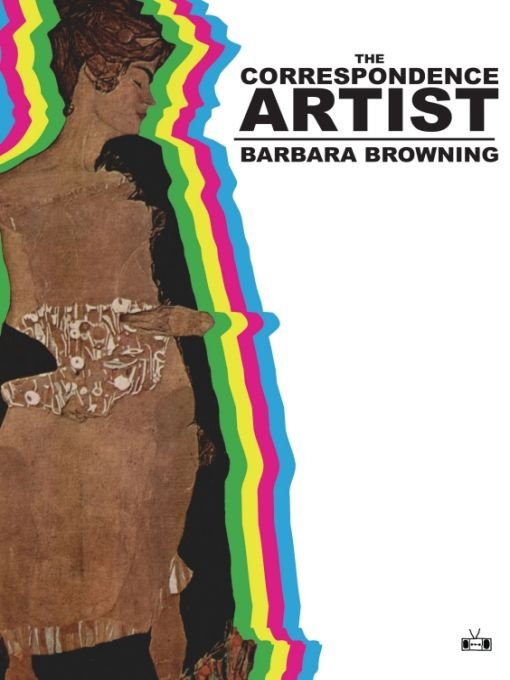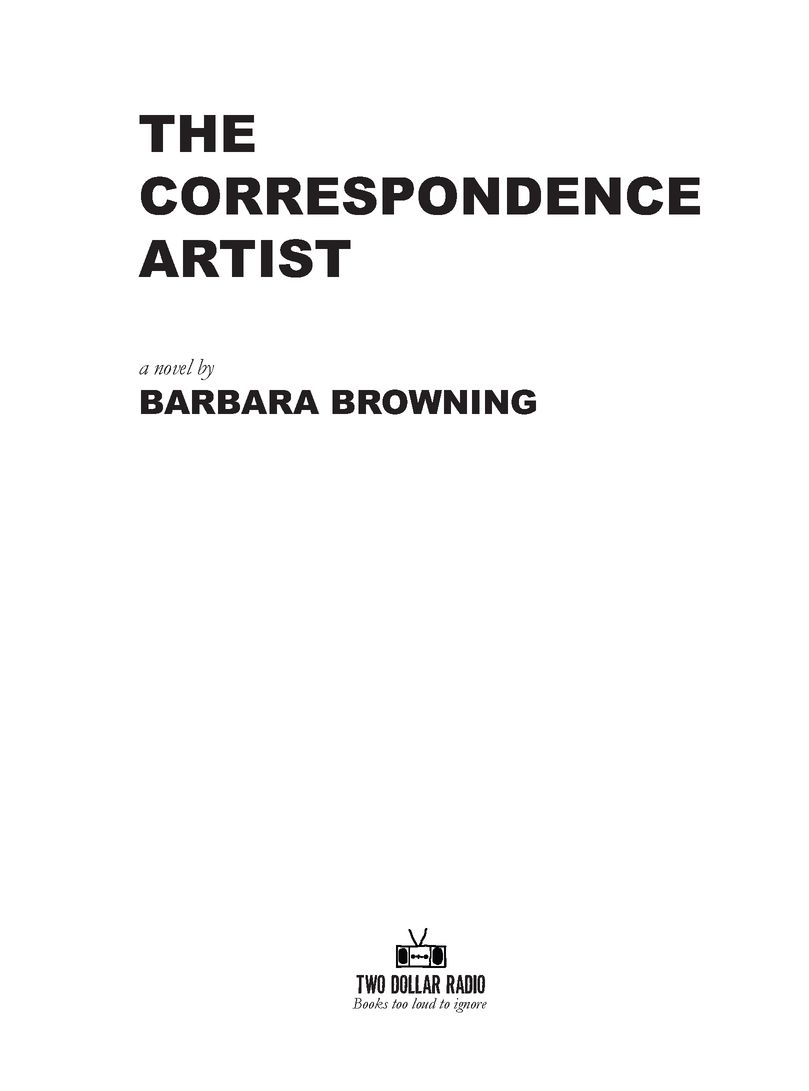The Correspondence Artist
Read The Correspondence Artist Online
Authors: Barbara Browning

Table of Contents
Â
Â
Â

This book was printed and bound in Canada by Friesens Corporation. It uses vegetable-based ink on acid-free FSC certified paper.

ENVIRONMENTAL BENEFITS STATEMENT
Two Dollar Radio Movement LLC
saved the following resources by printing the pages of this book on chlorine free paper made with 100% post-consumer waste.
saved the following resources by printing the pages of this book on chlorine free paper made with 100% post-consumer waste.


Calculations based on research by Environmental Defense and the Paper Task Force. Manufactured at Friesens Corporation
For R. Miller
“âAll characters in the following narrative are fictional, not real â but so are the characters of most of the people I know in real life, so this disclaimer doesn't amount to muchâ¦'”
âSlavoj Žižek, quoting a certain uncredited “Slovene author”
Â
In fact, certain explicit references are made to real public figures in the following narrative, but all actions and quotations attributed to them are entirely fictional, as is the rest of the story.
CHAPTER 1: COCA-COLA AND VIOLENCE
I
t isn't easy to be the lover of a great artist â particularly if you harbor any ambition of being an artist yourself. I once jokingly wrote to the paramour, “I'm the Nelson Algren to your Simone de Beauvoir.”
t isn't easy to be the lover of a great artist â particularly if you harbor any ambition of being an artist yourself. I once jokingly wrote to the paramour, “I'm the Nelson Algren to your Simone de Beauvoir.”
Perhaps you know the story of their love affair. Simone de Beauvoir went to Chicago for a speaking engagement, and Nelson Algren was the down-on-his-luck Midwestern novelist who showed her around town. They ended up having an affair and Algren suggested maybe she could move to Chicago to be with him. Of course she told him she couldn't possibly give up her life in Paris with Sartre. But she did like to travel with Algren through foreign countries, and she enjoyed corresponding with him in her slightly flawed English. She found him appealing because he was so American, so unquestioningly leftist, and simultaneously very modest and yet hungry for life. She also liked their sex.
This was very much the appeal I held for the paramour.
I think I can honestly say that I am a woman of extreme moderation. Some people find this attractive. I am neither old nor young. I'm good-looking but not remarkably so. I'm a professional writer â which is to say I make a living as a freelance journalist, and I plug away half-seriously at my poems and, as you can see, the occasional work of fiction. I am a sensitive, intuitive critic, but my own voice has a certain Midwestern flatness about it. Perhaps you've already noticed that.
I'd love to convince myself that my politics are radical, but I'm afraid a more cynical observer might label me a guilt-ridden white liberal. I'm aware of my complicity in the quagmire of global politics. In an attempt to make amends, I give a significant portion of my income to progressive charitable organizations. I sew most of my own clothes, or buy them second-hand. I'm fairly obsessive about recycling. You get the picture.
I am a very dedicated friend and correspondent. Actually, that's probably my real talent. I'm what you might call a correspondence artist.
I'm also a single mother. Sandro is fifteen, and while his temperament mirrors mine in many ways, he's more extreme: extremely tall, extremely thin, extremely beautiful, extremely left-wing, extremely pretentious. He's an expressive, lyrical pianist, but he has a dry sense of humor. Our domestic rapport is, on the whole, very harmonious. This is probably why I've remained single all these years. Sandro's father, Carlo, went back to Italy when Sandro was a baby. I had a series of lovers, some of them long-term, all of whom Carlo denigrated as “losers.” I said, “So Carlo, what about you?” He said, “I was the biggest loser of them all. Obviously, you need to feel superior.” It was hard not to concede this point to him.
He didn't know, however, about the paramour. It's the only time in my life I've been involved with someone so far above my station in life. Actually, it's the only time I've been involved with somebody solvent, let alone rich and famous. Obviously, these weren't really qualities I was looking for in a lover. I've been very discreet about this, though it's been going on for three years. I think it might be petering out. Since we live on different continents, our love affair has mostly been constituted by e-mail exchanges. At times, our obsession with this process has seemed entirely mutual. At other times the paramour seems to get distracted. My dedication has been unflagging. It's partly fueled, I'm embarrassed to say, by the vain and yet stubborn belief that
my overly informative and yet occasionally insightful missives might be feeding the creative process of a genius. I'm probably entirely mistaken. Sandro knows, of course, and he observes the relationship with wry detachment. This attitude helps me to remain detached as well. Sandro finds the whole thing mildly amusing, except when a pause in the correspondence makes me irritable.
my overly informative and yet occasionally insightful missives might be feeding the creative process of a genius. I'm probably entirely mistaken. Sandro knows, of course, and he observes the relationship with wry detachment. This attitude helps me to remain detached as well. Sandro finds the whole thing mildly amusing, except when a pause in the correspondence makes me irritable.
Â
Â
Saturday, March 29, 2008, 8:07 a.m.
Subject: I'm irritated with you
Â
If it's laziness, it doesn't cost so much to write to say, “I'm busy/exhausted/taking care of my kids/screwing a lot/having a neurotic crisis â I'll write you in a week.”
Â
If it's that fort/da game (“I'm going to push her away so she won't love me too much”) it's megalomaniacal.
Â
I woke up thinking this way. Maybe it's my hormones, but only partly.
Â
Â
That was an unusually blunt message for me to send. I think it signaled the beginning of the end. Or maybe the end began well before that. It seems clear that if I'm going to tell this story, this is the moment at which I need to tell you how I came to meet the paramour. But for obvious reasons, this is a complicated proposition â in fact, more complicated than you might think. Fame contaminates things. There are people who stand to profit from the most trivial information about my lover, and other people who stand to lose. So let's pretend it's Tzipi Honigman, the beautiful 68-year-old Israeli novelist who's just won the Nobel Prize.
In December of 2004, I wrote a review for
The Nation
of what I consider to be her most deeply affecting novel,
Embracing
Anomalies
. Of course, the Nobel followed the enormous critical success of her most recent book,
Problems are Defiant like Unattractive Angels
, and this may in fact be the superior work, but that earlier novel really changed the way I understood the power of figurative language. It was full of extended metaphors. It worked like a drug on me. By the end I didn't know anymore what the difference was between narration and figuration. It was trippy (sometimes behind her back I call her affectionately Trippy Honigman), it was sensual â but because of the context there were political ramifications. Fighting against the overwhelming tide of political violence, poetry was like a persistent, muscled swimmer that would reach the shore. Yet amazingly, she was never sentimental.
The Nation
of what I consider to be her most deeply affecting novel,
Embracing
Anomalies
. Of course, the Nobel followed the enormous critical success of her most recent book,
Problems are Defiant like Unattractive Angels
, and this may in fact be the superior work, but that earlier novel really changed the way I understood the power of figurative language. It was full of extended metaphors. It worked like a drug on me. By the end I didn't know anymore what the difference was between narration and figuration. It was trippy (sometimes behind her back I call her affectionately Trippy Honigman), it was sensual â but because of the context there were political ramifications. Fighting against the overwhelming tide of political violence, poetry was like a persistent, muscled swimmer that would reach the shore. Yet amazingly, she was never sentimental.
My review was appreciative, but more than that, it kind of took Tzipi's ball and ran with it. It was probably overwritten. I was inspired, or maybe I was infected. Anyway, Tzipi read it, and she liked it. She sent me an e-mail thanking me. She said that sometimes as a writer you don't really know what you're doing, and it was very gratifying when someone else understood you better than you had understood yourself.
When I found this e-mail in my inbox, I freaked out. You can imagine. I think I was her greatest fan. I think I still am. I called my friend Florence and read it out loud to her. The message was very long. Tzipi praised the brevity of my sentences, and apologized for her own, which she said had a tendency to snake around the page until they ended up swallowing their own tails. Another extended metaphor. She said she hoped we could talk more one day about writing. There was a strange and disconcerting line about another article of mine she thought she remembered reading which made an “antipathetic” comment about her. When I read this, my heart fell with a thunk â I knew what she was referring to, but I certainly hadn't thought of it as a slight. In a review of another Israeli writer's short story collection, I'd made passing reference to Tzipi's stature in the late
'70s as a national icon with something of a “hippie” aesthetic. I didn't consider this antipathetic. I like hippies. But Tzipi's style has certainly accrued a lot of elegance since then.
'70s as a national icon with something of a “hippie” aesthetic. I didn't consider this antipathetic. I like hippies. But Tzipi's style has certainly accrued a lot of elegance since then.
Florence didn't think I needed to worry too much about Tzipi feeling slighted by that hippie comment. Her message was very warm. Florence said, “You know, I think Tzipi Honigman is the most beautiful woman in the world. She makes you think there's nothing sexier than a woman in her 60s.” This is true.
Other books
The essential writings of Machiavelli by Niccolò Machiavelli; Peter Constantine
Saint's Sacrament - Sins of the Father by Laveen, Tiana
Rainbow Blues by KC Burn
Embracing Trouble (Trouble Series) by Bridle, Dee
I Was a Revolutionary by Andrew Malan Milward
Summer's Need by Ann Mayburn
Judith E French by Highland Moon
Rain Music by Di Morrissey
The Colonel by Alanna Nash